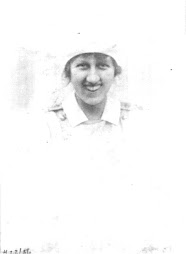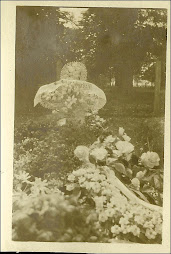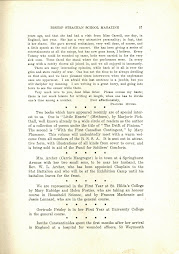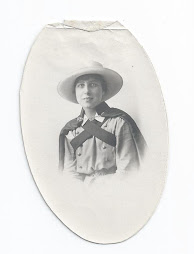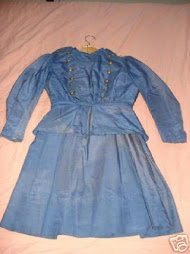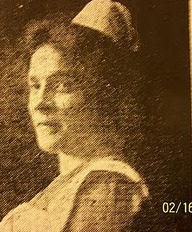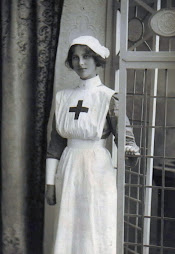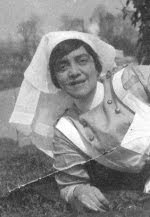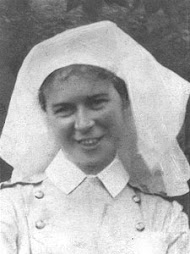A letter to the editor sent to the Vancouver Sun on April 6, 1919 raises questions that many of us still ask today about the failure to remember the nurses of the First World War:
"Many persons are expressing regrets that so far apparently no effort has been made to arrange for a public welcome to our returning overseas nurses. Since the war first sounded its clarion call to arms many of our local daughters have gone overseas to help in the great work of healing and bringing back to life those men who went near to the "Great Divide" inthe interests of the cause of the Empire. None, least of all the soldiers themselves, will gainsay the tremendous part played by those "ministering angels" to whose devoted service many thousands of men today owe their lives and limbs.
Many of those nurses have already returned home. Some will never come back having given their lives in the great common cause. Those who have returned, beyond the greeting of personal friends have received no public welcome and no public recognition of their services.
The same may be said of the many brave girls who for many months have been driving ambulances near the firing lines, daily in risk of their lives, but never for one moment giving a thought of their own safety, but as true Britishers "doing their bit" for humanity's sake.
Surely it is time that at least the various women's organizations of the city should come to some arrangement whereby a proper and fitting public welcome could be arranged for every brave returning woman worker who has rendered such unselfish service for our great Empire.
Everybody is out to welcome returning soldiers, and surely it should not be said in the years to come that the work of nurses and other war workers was allowed to pass unrecognized.
May I appeal to the women of the city to see that ever one of these brave women rece3ives a hearty public "welcome home?""
Signed "Beatrice"
Monday, January 26, 2015
Saturday, January 24, 2015
Wednesday, January 21, 2015
Heroic PEI Nursing Sisters in WWI
Book Review
Those Splendid Girls by Katherine Dewar explores the lives and work of the 115 nursing sisters of Prince Edward Island who served overseas during the First World War. During a visit to a local archive, Dewar read a 1919 article describing Island nursing sisters coming home from the war. It was on page eight of the newspaper, while images of returning soldiers were displayed on page one. “I concluded that nurses had got short shrift!” recalls Dewar, a former professor of nursing. Her book seeks to correct that imbalance.
Those Splendid Girls describes the lives of women like Rena McLean of Souris, PEI. Born into an upper class family, McLean graduated from the Newport Hospital Training School for Nurses in 1908. Like many who served in the Canadian Army Medical Corps, McLean was the cream of the crop—Head Nurse in the operating room of the Henry Hayward Memorial Hospital in Massachusetts. She was accepted into the CAMC early in the war and sent overseas in September 1914. Rena served in England, France, Salonika and on hospital ships. Sadly, like so many of the soldiers serving overseas, Rena would lose her life—drowned after a German torpedo ripped through the hospital ship Llandovery Castle on June 27, 1918.
Dewar doesn’t just report the facts about the nurses—she brings them to life with anecdotes gathered from family archives across PEI, photographs never seen before, quotes from the nurses themselves, and well-researched contextual material. Some of the stories are painful to read. Enroute home to Halifax, Nurse McLean writes “this may be my last trip over…” Before her return journey to England, she buys a flashlight “It will come in handy if we are torpedoed,” she tells her father.
Dewar provides a list of the decorations awarded to nurses, an extensive bibliography, and short bios of all the women who served, including those who enlisted in American and British nursing corps. The materials she gathered from families is invaluable. (When I researched Rena McLean for this blog, I wasn't able to locate these kinds of records--Dewar's work has added invaluable information about this courageous nurse.) She also explores why the nurses did not receive the hero’s welcome they deserved and why they are forgotten in our histories of the First World War. Dewar believes that sexism and the fact that nurses seldom died during the war (although over 70 Canadian women in various corps did lose their lives) meant that few historians thought their stories worthy of exploration. The women themselves also “saw no glory in war—nothing heroic,” writes Dewar. “At the end of the war, they packed away their diaries, their photo albums, and other memorabilia and buried their memories.”
It is fortunate for us that Dewar took the time to unpack those artifacts and bring these heroic women’s stories back into the light for all of us to learn from and enjoy. Those Splendid Girls is published by Island Studies Press and is available for $27.95. Reviewed by Debbie Marshall.
Those Splendid Girls by Katherine Dewar explores the lives and work of the 115 nursing sisters of Prince Edward Island who served overseas during the First World War. During a visit to a local archive, Dewar read a 1919 article describing Island nursing sisters coming home from the war. It was on page eight of the newspaper, while images of returning soldiers were displayed on page one. “I concluded that nurses had got short shrift!” recalls Dewar, a former professor of nursing. Her book seeks to correct that imbalance.
Those Splendid Girls describes the lives of women like Rena McLean of Souris, PEI. Born into an upper class family, McLean graduated from the Newport Hospital Training School for Nurses in 1908. Like many who served in the Canadian Army Medical Corps, McLean was the cream of the crop—Head Nurse in the operating room of the Henry Hayward Memorial Hospital in Massachusetts. She was accepted into the CAMC early in the war and sent overseas in September 1914. Rena served in England, France, Salonika and on hospital ships. Sadly, like so many of the soldiers serving overseas, Rena would lose her life—drowned after a German torpedo ripped through the hospital ship Llandovery Castle on June 27, 1918.
Dewar doesn’t just report the facts about the nurses—she brings them to life with anecdotes gathered from family archives across PEI, photographs never seen before, quotes from the nurses themselves, and well-researched contextual material. Some of the stories are painful to read. Enroute home to Halifax, Nurse McLean writes “this may be my last trip over…” Before her return journey to England, she buys a flashlight “It will come in handy if we are torpedoed,” she tells her father.
Dewar provides a list of the decorations awarded to nurses, an extensive bibliography, and short bios of all the women who served, including those who enlisted in American and British nursing corps. The materials she gathered from families is invaluable. (When I researched Rena McLean for this blog, I wasn't able to locate these kinds of records--Dewar's work has added invaluable information about this courageous nurse.) She also explores why the nurses did not receive the hero’s welcome they deserved and why they are forgotten in our histories of the First World War. Dewar believes that sexism and the fact that nurses seldom died during the war (although over 70 Canadian women in various corps did lose their lives) meant that few historians thought their stories worthy of exploration. The women themselves also “saw no glory in war—nothing heroic,” writes Dewar. “At the end of the war, they packed away their diaries, their photo albums, and other memorabilia and buried their memories.”
It is fortunate for us that Dewar took the time to unpack those artifacts and bring these heroic women’s stories back into the light for all of us to learn from and enjoy. Those Splendid Girls is published by Island Studies Press and is available for $27.95. Reviewed by Debbie Marshall.
Labels:
Island Studies Press,
Katherine Dewar,
Rena McLean
Subscribe to:
Posts (Atom)



